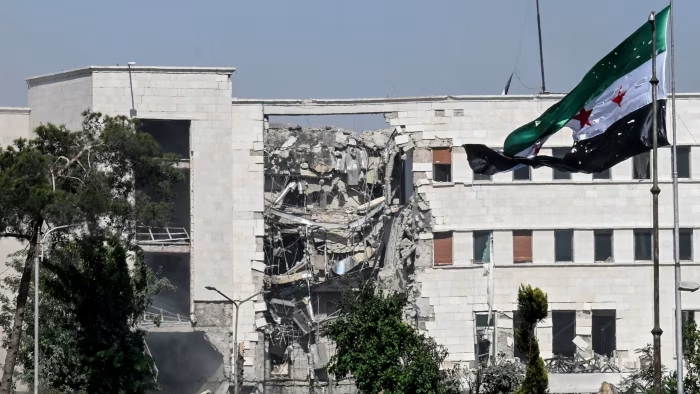Israel Strikes Syrian Capital Despite U.S. Warnings to “Stand Down”
In a sharp escalation of regional tensions, Israeli fighter jets launched a series of airstrikes on the Syrian capital Damascus early Tuesday morning, defying direct appeals from the United States to halt military operations. The strikes targeted key government and military sites, including installations near the presidential palace and the Syrian Ministry of Defense.
Israel Responds to Violence Against Druze Community
The Israeli government justified the offensive as a response to escalating violence in Syria’s southern Suwayda region, where pro-government forces have allegedly targeted members of the Druze minority. Defense Minister Israel Katz stated that Israel had moved from “warnings to action” in order to “defend human life and punish those who threaten it.”
“The State of Israel will not remain passive while ethnic cleansing takes place on its border,” Katz said in a press briefing. “Our operations are precise and aimed solely at military infrastructure enabling the assault on civilians.”
U.S. Urged Restraint, Israel Acted Anyway
The strikes come amid mounting pressure from Washington, where senior officials in the Biden administration—especially Middle East envoy Tom Barrack—have urged Israeli Prime Minister Benjamin Netanyahu and his national security team to avoid further escalation. According to reports by Axios and Reuters, U.S. intelligence has found no conclusive evidence that the Syrian government directly orchestrated the attacks in Suwayda.
Despite the warnings, Israel moved forward with its operation, citing urgent appeals from Druze leaders both inside Israel and in southern Syria. The Israeli Air Force reportedly carried out at least seven strikes near Suwayda’s military base in addition to the bombings in Damascus.
Syria’s Ceasefire Crumbles
The Israeli assault follows the collapse of a fragile ceasefire between Syrian government forces and local Druze militias in Suwayda. Clashes between Druze, Bedouin groups, and pro-Assad militias reignited over the weekend, with reports of indiscriminate shelling in residential neighborhoods.
At least seven Syrian military personnel were reportedly killed in the strikes near Suwayda, with one confirmed fatality in Damascus. Casualty numbers are expected to rise as rescue efforts continue in the capital.
Global Reaction and Rising Concerns
The strikes have drawn swift condemnation from Turkey and the European Union, both of which warned that further cross-border actions could destabilize Syria’s fragile transitional government, led by interim President Ahmed al-Sharaa.
United Nations officials expressed concern that continued Israeli air raids may trigger retaliation from Syrian or Iranian-backed factions, risking a broader regional conflict.
Analysis: A Dangerous Precedent
Israel’s decision to target central Damascus—long considered a red line—marks one of the boldest moves in its regional policy in recent years. Analysts warn that this shift signals a growing Israeli willingness to act unilaterally in Syria, regardless of U.S. strategic preferences.
“This is not just about Suwayda,” said regional analyst Rana Khoury. “It’s about Israel drawing new lines on intervention, sovereignty, and deterrence—and doing so without waiting for American approval.”
Key Takeaways:
Israel bombed military sites in Damascus and Suwayda in response to Druze-targeted violence.
The U.S. warned against escalation, but Israel proceeded with strikes.
Regional actors warn the situation could spiral if diplomatic efforts fail.
Share this content:














Post Comment